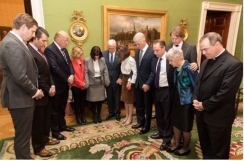
Today's riddle: Many people love to have them but don't want to see them, particularly those of others. What are these?
Answer: Selfies. And the explanation that goes with this is called the "selfie paradox," according to the Daily Mail.
According to the online news source, a new study has revealed that people who love taking selfies have love-hate relationship with themselves.
Researchers said many people who regularly take selfies are actually not interested in viewing them and those of others but would love others to see their selfies.
The study found that 82 percent of selfie takers would rather view "normal" photos on social media.
Why is this so?
Sarah Diefenbach, a German professor who coined the term "selfie paradox," provides an answer:
"The selfie as a self-advertisement, plying the audience with one's positive characteristics, or the selfie as an act of self-disclosure, sharing a private moment with the rest of the world and hopefully earning sympathy, appear to be key motivators," she explains.
The Christian view of selfies is something else.
According to Got Questions Ministries, while there's nothing inherently wrong with taking selfies and sharing them with others, the selfie culture is rooted in narcissism.
"By posting selfies, any person can taste a droplet of fame, which can quickly become addicting. However, this obsession can impact self-worth and true relationships when personal value is based upon the number of 'likes,' followers, replies, or comments received in response," the Christian ministry states.
One can see a "clash of values" when comparing the selfie culture with what's written in the Scripture.
Jesus called John the Baptist "the greatest in the kingdom of God" (Luke 7:28), yet John regarded his personal fame this way: "He must increase, but I must decrease" (John 3:30).
Jesus also pointed out that to be great in the kingdom of God, one must become a servant (Matthew 23:11). Whenever the people would try to make Him king, He would leave them and go to remote places to pray (John 6:15).
This clearly shows that Jesus' life was the "antithesis of the selfie culture's obsession with self," the ministry states.


















